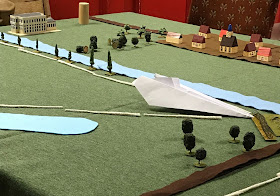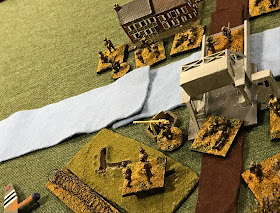We had six Horsa gliders each carrying a small (c20 man) platoon and a 5 man Royal Engineer detachment.
John ran the game. The players were me, Richard and (in the photo) Jerry, Tim C and Martin. John, Jerry and Martin sported very smart red berets. Lacking such headgear, I wore my Catering Corps beret.
I'm no good in a fight but I make a great pot of tea...
See also Richard's report here.
To keep things simple we numbered our platoons 1-6 and allocated missions for each. Everyone was. however, briefed on all of the missions so platoons could be easily re-ordered once on the ground. If we survived that long. The landing would take place in pitch darkness.
To help with orientation, most of my photos were taken from the NE corner of the table.
The missions were:
1. Take the bridge(!), sappers to neutralise any demo charges and make safe. (1 Plt - Jerry)
2. Take the pillbox N of bridge (suspected to be the control point for the demo charges). 2 Plt (me)
3. Clear the East Bank (3 Plt - Richard)
4. Secure the defensive works (5 Plt - Tim C)
5. Take Ranville Bridge (just off-table on the road to the East) (4 & 6 Plts - John & Martin)
First though, we had to build and land our gliders....
1 Plt and Maj Howard prepares to land (the white pipe cleaners mark the LZs - 'X' in the South, 'Y' in the North.
And he's down. A well-aimed landing by Jerry!
Richard's 3 Plt touches down
Tim C's 5 Plt lands
A couple of photos now on my own creation which, if I say it myself, flew and landed beautifully!
I even added some 'period' markings...
All 5 gliders (1/300 models provided by me) on the ground. Only five? Well yes. 4 Plt was last seen heading well to the East....My toys, so I chose the artistically crashed model. These Horsas have been around since the mid-1980s and were originally owned and painted by my old friend Scott P.
We stumbled out of the gliders...
...and got ourselves organised for our missions.
Some German MG42 fire was swiftly dealt with (the chaps on the far side of the canal) and many of the foreign (Italian, Polish etc) conscripts fled.
The East bank and the bridge were quickly secured, and a platoon pushed forward to secure the west.
As we sorted out a defensive perimeter, noises were heard.....
...and a couple of tanks rumbled very slowly down the road towards us. While each glider had been loaded with a PIAT and a stock of Gammon Bombs, only two of the former had survived the landing and none of the latter could be found!
After some anxious moments the fourth(!) PIAT round struck home. Having all the players shout 'twang' seemed to make all the difference to the die roll. (The PIAT being a spring-powered device). The other Panzer buggered off at this point and we settled in to await the arrival of 6th Airborne Div and/or Lovat's Commandos.
A German patrol boat appeared from the North and was dealt with. Then as it git light we came under distant sniper fire. The captured AT gun next to the bridge was brought into action but shelling the chateau led to no slacking of sniper activity. A couple of rounds at the nearby water tower seemed to do the trick though!
Eventually British armour appeared from the North and Lovat, led by his piper from the East.
Our work here was done. A well-researched and run game from John, helped enormously by the good-natured role playing of the players.
Our own very modest contribution to the D-Day commemoration.





















Now that looked like a lot of fun! I really enjoyed the paper airplane doing your actual landing for you, great idea!
ReplyDeleteSuperb looking game. A fine tribute.
ReplyDeleteCheers,
Pete.
Don M
ReplyDeleteWhat better way to simulate a glider landing? A 'technique' which has been used may times over the years!
Pete
ReplyDeleteThanks Pete!
Cool
ReplyDeleteWhat a cracking game! That is just the kind of thing that I want to run on my table. I love the paper aeroplanes idea for simulating the glider landings.
ReplyDeletePIAT did indeed have a hefty spring and that fired a charge in the body of the projectile (like a Spigot mortar). One of the common myths about the PIAT is that the spring provided the propulsion energy.
Best wishes,
Jason
Quick question Tim... I'm about to have a play with my own Blogger setup and was wondering how to put the pictures on the side of the blog - can change the defaults, it's adding new pictures. Thanks.
ReplyDeleteRob
Splendid stuff sir, I recall dropping bits of paper for each "stick" during an old running of an Arnhem 20mm game years ago, a number u unhelpfully pirouetted straight over the side of the table! I did my own little 20mm Rapid Fire solo version of Pegasus Bridge on the 6th, but I don't think I can share a picture here. Needless to say it was magnificent! Just picture the best ever Pegasus Brudge set up, and you're pretty much there!! I do like the glider landing paper planes, inspired!
ReplyDeleteGeordie
ReplyDeleteThere was a certain lack of coolness when the PIAT bombs were bouncing off that Panzer!
Jason
ReplyDeleteIt’s the best way to simulate a glider - by making a glider!
Rob Young
ReplyDeleteYou are a desperate man indeed if you need IT advice from me! Do you mean the background pictures?
Ken H
ReplyDeleteThere remains no finer method of simulating para drops than the ‘bits of paper’ approach.